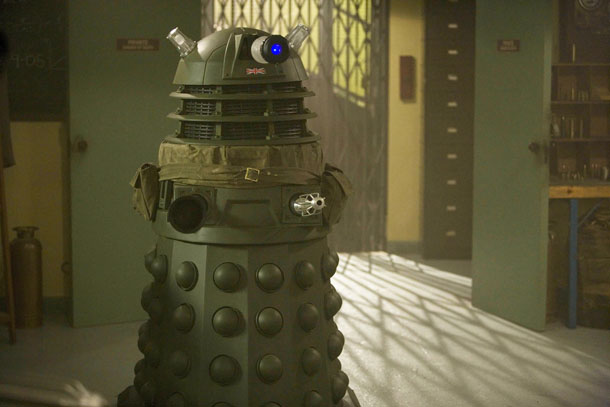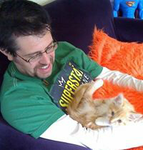Steven Moffat Interview Part Three
None
Nick Setchfield talks to Doctor Who ’s new showrunner about Matt ("he’s born to it”), Karen (“she’s the best one ever”) and comedy writers

SFX : Russell T Davies told us he thought he could never make a multi-Doctor story work, but that Steven Moffat could. Do you think you could?
“I can absolutely do eight minutes! And I think anyone can make eight minutes work, including Russell. I saw that quote and it’s rubbish. Of course he could have written that. It’s not that hard. I think to make a story that’s interesting, in a timey-wimey way, the star of the story would not be all of the Doctors getting together to fight a great big menace. That’s nonsense – it’s just the same man, several times over. Why would he need other versions of himself? That’s not relevant. But to have him encounter the same events at several different points in his own life would be interesting. It is odd because they’re not quite the same personality. I’m absolutely not against it, but I’ve never personally thought of a story that would justify it completely for me. I think Russell’s made this point already, but he’s absolutely right – those stories are nobody’s favourites. Everyone looks forward to them more than they look back on them.”
SFX : What will Matt bring to the role that’s completely new?
“He’s a completely different take on the Doctor. I suppose on the one hand he’s young, and there’s quite a modern style to him. On the other hand – and it’s about 50/50 – he’s almost a throwback to the more bonkers Doctors of the original series. He is bonkers. He’s mad, mad. And because Matt is so effortlessly cool we don’t ever have to worry about that, we just let him be. He can wear a bowtie and get away with it, dear God! And actually want to. The very first time he did the audition it was just obvious that he’s one of the people who are going to play Doctor Who. He’s born to it.”
SFX : Does he need time to recover after the regeneration, like David did in The Christmas Invasion?
“All I’ll tell you is he does not spend the first episode on his back! He’s straight into the thick of the action, but that doesn’t mean he’s functioning at full capacity. Wait and see! That first episode he doesn’t get time to draw breath. It’s continuous action. He has no time to change his clothes or even check what he looks like before he’s back in harness. It’s a very bad day for him! I worked out once – and this is a moderate spoiler, I suppose – that from the time he arrives on the planet of the Ood to the end of our third episode the Doctor hasn’t been to bed! So by the time he puts on his pyjamas and picks up the book he was reading the previous night he thinks ‘Woah!’” [laughs]
Get sneak previews, exclusive competitions and details of special events each month!
SFX : Do you find yourself writing in Matt’s own characteristics – his twiddly fingers, for instance?
“Not particularly, he just does that anyway. I did when I did the little scene for the end of ‘The End Of Time’. I thought I’ll just reference everything that everyone’s noticed, the fingers, the chin, and the hair. I thought I’ll just tick them all off, because that’s what you’d notice if you’d just arrived in that body. But other than that you just really let him get on with it. If you just grab somebody’s first mannerism and say that’s what it’s going to be then that’s just a naff bit of writing.”
SFX : And how does Karen shape up as a companion?
“I think she’s the best one ever. I honestly do. I think she’s engaging, utterly beautiful – but utterly beautiful in that way that somehow doesn’t make you feel slightly frightened, even though she’s several inches taller than you! I don’t want to say too much about that character because there are twists and turns along the way. Karen is adorable, completely adorable, so although she’s model beautiful you still have this vague idea that it’s alright for you to talk to her, which I don’t usually when I talk to women like that – I cringe in shame and sidle out of the room. And she’s kind of mad too. There’s a real proper madness to Karen that just comes over on the screen. So there are two complete mad people in the TARDIS which is just hilarious. And what they have in common, which I think is great, is that they’re both very, very funny movers – when that TARDIS shakes you’re falling around laughing. They’re like two giraffes.”
SFX : Did you want to write all 13 episodes yourself? Is it difficult to hand over your baby to other writers?
“Not really. There are shows where I’ve felt, ‘I want to do all this myself,’ and I’ve done that – I’ve mostly done that – but I think Doctor Who actually properly benefits from different voices coming through it. Bringing unexpected notes into it, that I wouldn’t have thought of, is a very, very good thing. At the same time, it’s got to feel like the spine of the same show. But different voices, different writers, absolutely also. I suppose you could point to some of the Americans who do write all the shows themselves, but also have huge writing staffs, mysteriously doing something or other that they never mention! I think Doctor Who benefits from a number of different writers.”
SFX : Did the other writers come to you with story ideas or did you approach them saying, “I’d like a story set on Planet X”?
“It’s mostly me asking for something. Mostly, but by no means always. It’s always a mix of that. If everyone wants to do a show on a space station it’s not going to be very good, so generally speaking I’ve got a pretty good idea of the slot that I want. For instance I was saying to Toby [Whithouse], ‘I want something that could be episode one.’ It’s in the middle of the series, so you can start watching it again – something romantic and funny. In that opening discussion you might go a long way from what I’m suggesting, but generally speaking it sticks fairly close. Writers can only have the kind of freedom you want them to have if they know their parameters. If you say, ‘You mustn’t do that, because we’re doing it in episode seven.’ Once they have a clear idea of what they’re providing, whether it’s a funny one or a scary one, you try to give them as much freedom as they can possibly have.”
SFX : Four of your writers have backgrounds in comedy writing. Is that relevant?
“Not especially, no. Comedy is a fantastic discipline – good comedy writers are just good writers full stop, because comedy, believe me, is just harder. And it does, not in the sense of being funny, help you to write a show like this, because it’s so disciplined. Every line has a point, every scene has a point. In the case of comedy it’s just to be funny. Funny writers are good at writing scary, because they know how to deliver a punchline. Now the punchline in scary doesn’t make you laugh, it makes you jump, but it’s the same skill-set to get there – hold back the information and land it with one whack at the end of the scene or in the middle or wherever it happens. So no, there’s no particular ambition towards comedy writers, but look at those comedy writers – those are just great writers full stop.”
SFX : Is it quite tough to find the writers who get the show instinctively?
“No, because there’s an awful lot of writers who desperately want to do it, to be honest. The queue is intimidating! Sometimes with the ones who are less familiar with the show they are learning to write science fiction, which really means learning that science fiction isn’t a separate genre at all. It’s just drama, with more science in it. Or what we call in Doctor Who ‘Ha ha’ science. It’s a bit like comedy, in a way. When people first attempt to write comedy they throw all the other rules of drama out. That’s not right. You add the rules of comedy to the rules of drama. You’re not allowed to have people behave in ridiculous ways just because it’s a comedy, and likewise in science fiction it’s just drama, or action-adventure. It just so happens it has some spaceships in it. So bizarrely enough learning to write science fiction is learning just not to write it.”


Dave is a TV and film journalist who specializes in the science fiction and fantasy genres. He's written books about film posters and post-apocalypses, alongside writing for SFX Magazine for many years.


